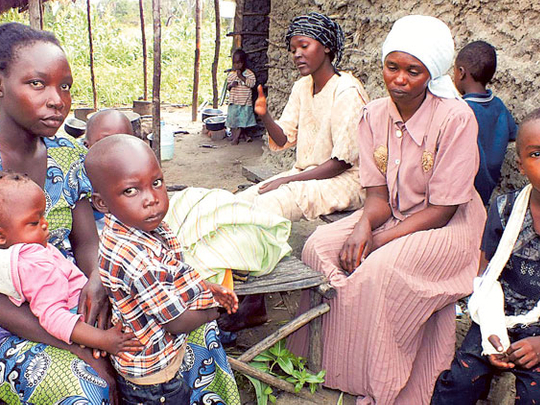
Mombasa, Kenya: Gunmen killed at least 29 people in raids on two coastal areas of Kenya, the latest in a series of attacks claimed by Somali Islamists who have vowed to drive Kenyan forces out of Somalia, although a police officer cast doubt on their role.
The Interior Ministry said one attack killed nine in the trading town of Hindi in Lamu County, the same district where about 65 people were killed by gunmen last month. Another was further south in the Gamba area, where 20 died.
“They went around shooting at people and villages indiscriminately,” said Abdullah Shahasi, a senior official for the Hindi area, which lies near the old trading port of Lamu and Mpeketoni town, where gunmen launched raids in mid-June.
Shaikh Abdiasis Abu Musab, spokesman for Al Shabab’s military operations, told Reuters in Mogadishu that the Somalia-based group was behind both attacks on Saturday night.
It had also said it was responsible for the June raids in Lamu county, around Mpeketoni.
But President Uhuru Kenyatta dismissed Al Shabab’s claim last month and blamed local politicians, stoking an already fierce row with the opposition, which denied any role.
Regardless of who is blamed this time, Saturday’s raids will hammer an already beleaguered tourist industry that has been hit by a wave of militant attacks and will deepen public frustrations about poor security in Kenya a day before a big opposition rally is planned for the capital.
In a news conference on initial findings, police deputy inspector general Grace Kaindi said a blackboard, ripped out of a school, was found at a junction near Hindi with scrawling that could implicate the coastal separatist group, the Mombasa Republic Movement (MRC). She said investigations were ongoing.
“At first we thought it was Al Shabab, but now it is turning out that it is MRC as they have put it there clearly,” she said, adding that other slogans appeared to back opposition leader Raila Odinga.
She said scribbled phrases included “MRC - You are sleeping,” “Muslims your land is being grabbed”, “Raila is adequate” and “Uhuru down”.
The MRC swiftly denied any role. “The government should stop using us as a scapegoat,” Randu Nzai Ruwa, the MRC Secretary-General, told Reuters by telephone.
Al Shabab, which attacked Westgate shopping mall in Nairobi last year killing 67 people, said it had broken into the police station at Gamba and freed suspects from detention cells.
A police source corroborated that Gamba account, saying the numbers for those released was still being checked. Gamba lies in Tana River county, which neighbours Lamu County.
“They killed some of our colleagues and freed Muslim detainees,” the source told Reuters. “Some of those freed were linked to the Mpeketoni attacks two weeks ago.” Lamu County Commissioner Miiri Njenga said attackers hit government offices. Police said a church was also burnt.
Attacks on the coast have fanned an already tense political atmosphere in Kenya, which has sent troops to join African troops battling Al Shabab in neighbouring Somalia.
Veteran opposition leader Odinga, defeated by Kenyatta in last year’s presidential election, has held a series of rallies over the past month criticising the government over frequent militant attacks, corruption, a slow economy and other issues.
Kenyatta stepped into an already heated debate by accusing local politicians of being behind strikes on Mpeketoni.
Opponents saw his statement as fingering Odinga.
Odinga has promised a rally on Monday in Nairobi, calling for people to take the day off work. The government said public workers who stay away from work will face disciplinary action.
Religious leaders have urged Kenyans to avoid rallies that could deepen divisions in a nation scarred by political violence in the recent past. Political allegiances in Kenya tend to follow ethnic lines. Police have promised tight security.
The nation is haunted by the 2007 presidential election, when 1,200 died in weeks of ethnic blood-letting — over which Kenyatta still faces trial at The Hague this year for crimes against humanity. However, last year’s vote went off calmly.












